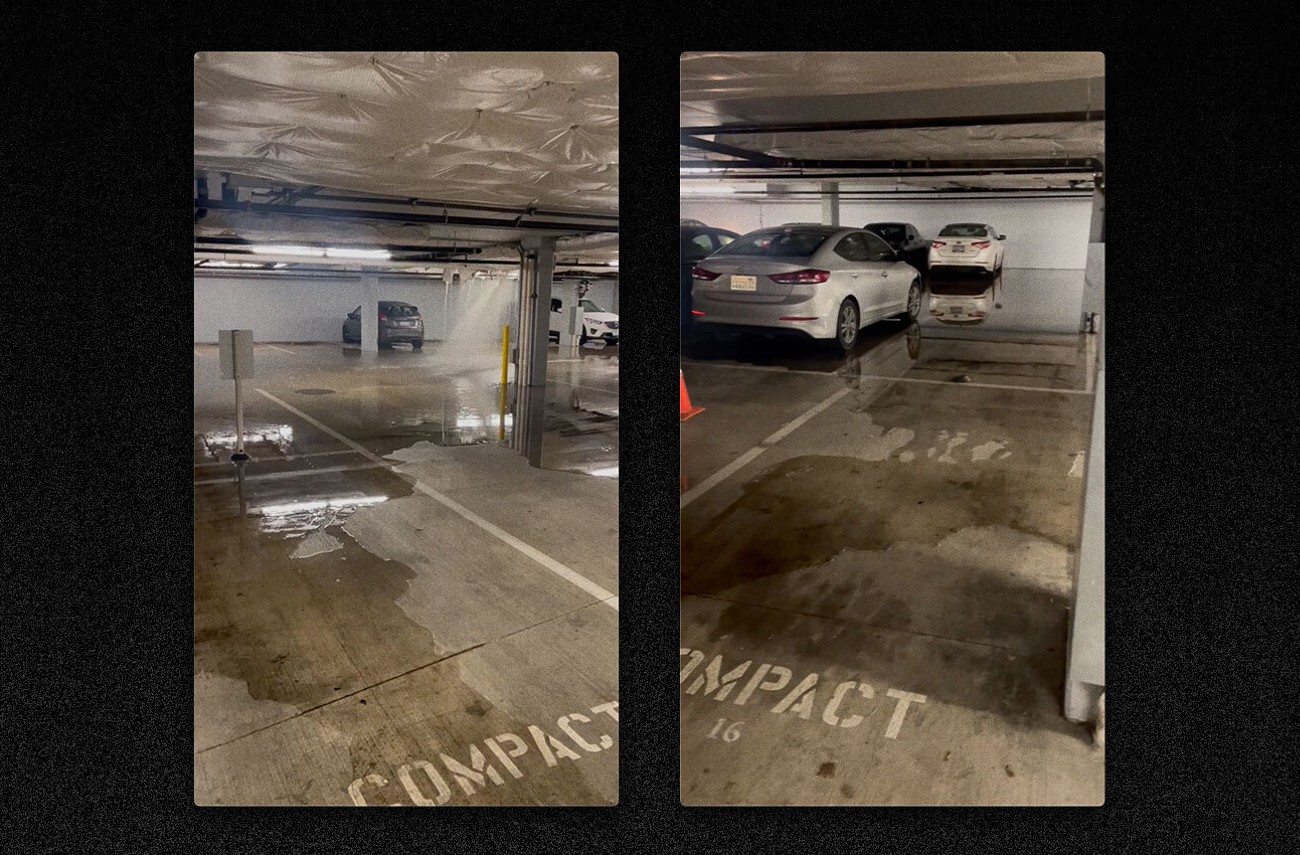During the recent cold snap, my six-month-old baby and I had no water for three days in my apartment in Columbia City because a water pipe burst in the building. I had to get leftover ice from the ice machine on another floor, carry it downstairs, and melt it to make bottles for my baby, give my dog water, brush my teeth, and flush the toilet.
I couldn’t shower, give my baby a bath, cook, do laundry, or even use the toilet. And neither could the 100+ other tenants in my building.
All the while, the property management company, Cushman & Wakefield, barely communicated with us. They didn’t give us any timeline about when the water would be turned on until we organized a tenant’s association and made demands.
After several weeks of organizing, Cushman & Wakefield credited our accounts three prorated days of rent, which is a fraction of the cost of a hotel for that time without water. The company told tenants to use our rental insurance to get reimbursement for a hotel room. But many people can’t afford deductibles, and using the insurance would cause our policy rates to increase—and some tenants’ insurance didn’t cover this situation at all. We are continuing to organize for just compensation.
The company has not yet met with us in person and instead set up a virtual meeting with less than 24 hours' notice. During this meeting, the property managers informed us that they needed a security guard to meet with us, saying, “I’m sure you guys have seen the news. People in our industry get injured and/or killed at an alarming rate… With the type of communication we’ve been receiving, we truly don’t feel safe.”
Who knew being a corporate stooge was so dangerous! This is a very diverse building in one of the most diverse zip codes in the US—I can’t help but wonder if that contributes to their fear.
Of course, the only real danger for our property managers is that we’ll continue to organize and find more potential code violations and potentially shady practices.
While the pipe was eventually fixed, our building still has many problems. For example, last year, a fire damaged part of the rooftop deck—it’s still not fixed. Supposedly, contractors have been hired to fix this damage, a fact tenants learned only shortly after we filed a complaint to the Seattle Department of Construction and Inspection.
Also, we didn’t have consistent hot water in the building for three weeks in the middle of winter. Though management claimed to have completed a temporary fix in early January, a representative from the City of Seattle actually provided tenants with more information about those repairs than the landlord, and the landlord only started communicating with us about the issue after a tenant filed a complaint with the City of Seattle.
Furthermore, there may be more, but as of now a handful of tenants have discovered that their leases stated that the landlord would pay the utilities, but Cushman & Wakefield has continued to charge these tenants for utilities, either stating that a vague utility addendum overrides that provision or that a leasing agent made a mistake.
Additionally, under Seattle’s Third Party Billing Ordinances, landlords are required to provide in writing the methodology explaining how utilities are calculated and allocated among tenants and common areas. When asked for this, Cushman & Wakefield has told tenants to refer to their utility addendum, but the addendum only provides a basic description of how the charges are determined–it does not provide the actual formula. For example, the water charge is based on “the number of persons residing in your dwelling unit using a ratio occupancy formula,” but there is no other information provided that fully explains how costs are allocated.
Cushman & Wakefield has also charged at least one tenant two separate fees for their background screening: a $37 “application fee” and a $13 “internal application fee.” Under city law, landlords can only charge tenants for the actual costs of obtaining a background check and they have to provide a screening company receipt when the tenant requests it. Eventually, the property manager turned over this receipt–turns out the background check was $13. In an email, Cushman & Wakefield said the $37 was for costs incurred "verifying income and previous housing history."
I question whether this aligns with the city law, which does not mention reimbursing the landlord for the costs of verifying income and previous housing history. This $37 is small, but across the entire Cushman & Wakefield portfolio, this could be a substantial amount of money charged for “verifying income and previous housing history.”
Tenants also noticed a sign on a common room door informing residents of a $150 fee necessary for a reservation. It's the room we use for our organizing meetings. Management most recently has stated this cost was $25 an hour with a $250 deposit.
When we asked them about the fee, a representative from Cushman & Wakefield “clarified” that “the reservation fee of $150 for the lounge has been a longstanding practice, not a recent decision, and certainly not intended as a form of retaliation. It has been in place to ensure responsible and equitable use of the lounge facilities.”
“However,” the representative continued, “In light of the formation of the new tenant association, I am open to considering waivers for this fee, provided that it is designated solely for the activities and initiatives of the association.”
Nothing in my lease states tenants have to pay any fee to reserve the common room, and our keys give us access to the room. I’ll let readers decide if being "open to considering waivers for this fee" sounds like retaliation for tenant organizing.
Cushman & Wakefield did not respond to multiple requests for comment on all of these issues.
To add insult to injury, this building has a Multi-Family Tax Exemption (MFTE), which gives real estate developers millions of dollars in tax breaks to incentivize housing construction in exchange for affordable units. In other words, this property gets a tax break even though the property management company does not seem interested in addressing these issues.
Cushman & Wakefield seems to believe lease terms are optional for landlords and mandatory for tenants. But that isn’t how contracts work. My building is organizing to enforce our rights and fight these practices—you should organize your building, too. It’s super easy.
Step 1: Knock all the doors in your building and ask your neighbors if you have any issues about living in the apartment.
Step 2: Set up a meeting in your building in a common space. In the City of Seattle, tenants have the right to organize, and landlords cannot retaliate. You can post notices on bulletin boards and on your neighbors’ doors.
Step 3: Dig through your lease–report your landlord if you find violations, too.
If you do suspect your landlord is violating the law, then you have several City offices you can turn to:
- Seattle Department of Construction and Inspection enforces Seattle landlord-tenant law, building code violations, and maintains a helpful website explaining landlord-tenant laws.
- Seattle Office of Civil Rights investigates illegal discrimination in a variety of spaces, including landlord discrimination against tenants.
- Seattle Office of the Hearing Examiner enforces the City’s Third Party Billing Ordinance.
Step 4: Gather everyone’s contact information and start listing demands.
Step 5: Select the demands in a democratic fashion, present them to your property manager, and let the fun begin.
Our building has people ranging in age from six months to 80 years old. We’re parents, teachers, nonprofit workers, hospital workers, and retirees. We’re real people and we deserve to be treated like it.
Live in a Cushman & Wakefield building and want to join our effort? Contact us at greenhousetenants37@gmail.com
Rebecca Parson is a member of the Greenhouse Tenants Association.



















